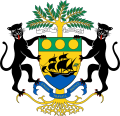Parliament of Gabon Parlement du Gabon | |
|---|---|
 | |
| Type | |
| Type | |
| Houses | National Assembly Senate |
| Leadership | |
Paulette Missambo since 18 September 2023 | |
Jean-François Ndongou since 15 September 2023 | |
Leader of the Opposition | Vacant |
| Seats | 245 members (145 and 100) |
| Elections | |
| single-member constituency | |
| single-member constituency | |
Last National Assembly election | 27 September 2025 |
Last Senate election | 26 August 2023 |
| Meeting place | |
| Palais Léon M'ba, Libreville | |
 |
|---|
The Parliament of Gabon consists of two chambers:[ citation needed ]
Contents
- The Senate (Upper Chamber)
- The National Assembly (Lower Chamber)
The Parliament was suspended following the coup d'état four days after the 2023 general election. [1] It was then replaced by a Transitional Parliament until new elections in 2025 selected deputies of the National Assembly. However, no timeline for the reconvening of the Senate has been set. [2]